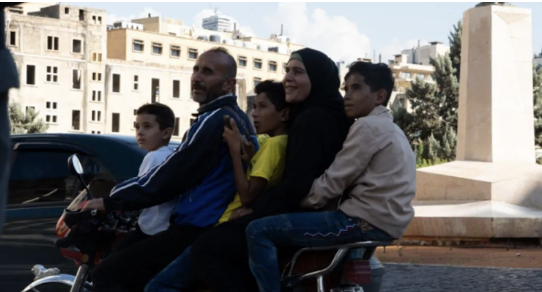Across southern Lebanon, families hurriedly gathered their belongings and fled north in cars, trucks, and on motorcycles as the Israeli military conducted strikes on targets it claimed were linked to Hezbollah, the Lebanese Shia armed group. Residents reported receiving warnings via text messages and voice recordings from the Israeli military advising them to evacuate areas near Hezbollah positions.
Zahra Sawli, a student from the southern town of Nabatieh, described the intensity of the bombardment to the BBC’s Newshour program. “I woke up at 6 a.m. to the sound of bombing. By noon, it started to get really intense, and I saw a lot of strikes in my area,” she recounted. Despite the chaos, she and those with her chose to stay inside.
“Where are we supposed to go? A lot of people are still stuck on the streets. Many of my friends are still stuck in traffic because so many people are trying to flee,” she added.
By midday, roads leading north toward Beirut were choked with vehicles, all heading to the capital along a six-lane coastal highway. Other images depicted people walking along the beach in the southern city of Tyre, with smoke rising from airstrikes in the countryside.
The BBC spoke to one family of five who arrived in Beirut on a single motorbike, traveling from a village in the south to Tripoli in the north. They appeared exhausted. “What do you want us to say? We just had to flee,” the father remarked.
By Monday evening, the Lebanese health ministry reported that 492 people had been killed and over 1,600 injured due to the bombardment, including at least 35 children among the dead. The Israel Defense Forces (IDF) stated that they had conducted 1,100 strikes in the previous 24 hours, including an airstrike in southern Beirut targeting a senior Hezbollah commander.
In Beirut, anxiety was palpable as people from the south arrived with cars laden with suitcases, while some residents of the capital were also evacuating.
Israel has issued warnings for residents to evacuate areas it claims are used by Hezbollah to store weapons. However, recorded warnings were also sent to neighborhoods in Beirut not typically associated with Hezbollah, such as Hamra, which houses government ministries, banks, and universities.
Parents quickly rushed to schools to retrieve their children following these alerts. One father, Issa, told Reuters, “[We’re here] because of the phone calls. They’re calling everyone and threatening people by phone. So we’re here to take my boy from school. The situation is not reassuring.”
Mohammed, a Palestinian man traveling with his wife, expressed his fears as they left Beirut. When asked about staying in the capital, he said, “In Lebanon, nowhere is safe. Israel is saying they are going to bombard everywhere. Now they threatened this neighborhood, so where should we go? It’s scary, I don’t know what to do—work, go home, no idea what to do.”
As a BBC crew set up on one side of the road, a taxi driver alerted them to a fuel crisis emerging due to the influx of evacuees into Beirut. Schools were hastily repurposed into shelters for those fleeing from the south. Following a government order, schools in Beirut, Tripoli, and eastern Lebanon were designated as temporary shelters.
The BBC visited a classroom in a public school in Bir Hasan, west Beirut, which was being prepared for evacuees from the Bekaa Valley, a Hezbollah stronghold targeted by Israel. Workers noted that the classrooms were stacked with mattresses and expected to be fully occupied by day’s end.
Lebanon’s hospitals were also instructed to cancel all non-elective surgeries as they braced for an influx of casualties and injuries. Despite the tense atmosphere in Beirut, some residents remained defiant. “If a total war happens, we should stand as Lebanese people together regardless of our political affiliations because, at the end of the day, our country is getting bombed,” one man told the BBC.
Others expressed a sense of resignation to the violence. Shop owner Mohammed Sibai remarked, “If they want war, what can we do? It was imposed on us. We cannot do anything.” Mohammed, a 57-year-old from Dahieyh, Hezbollah’s main power base in the capital, shared, “I have survived all the wars since 1975, so it’s normal for me. I will not leave; I will be in my house.”



